Women could be a key to great ape conservation in the Congo
Empowered women are working with environmental groups to help conserve gorillas, bonobos and chimpanzees in the Democratic Republic of the Congo.
- The Bonobo Conservation Initiative (BCI), Gorilla Rehabilitation and Conservation Education Center (GRACE), Jane Goodall Institute (JGI), and Coopera are all organizations working with women in and around the Democratic Republic of the Congo to help advance great ape conservation through education, empowerment, healthcare and food security access.
- Some examples: BCI helps fund pilot micro-credit projects for women who want to launch business enterprises, including soap and garment making. GRACE employs women as surrogate mothers for newly orphaned gorillas during an initial 30-day quarantine period.
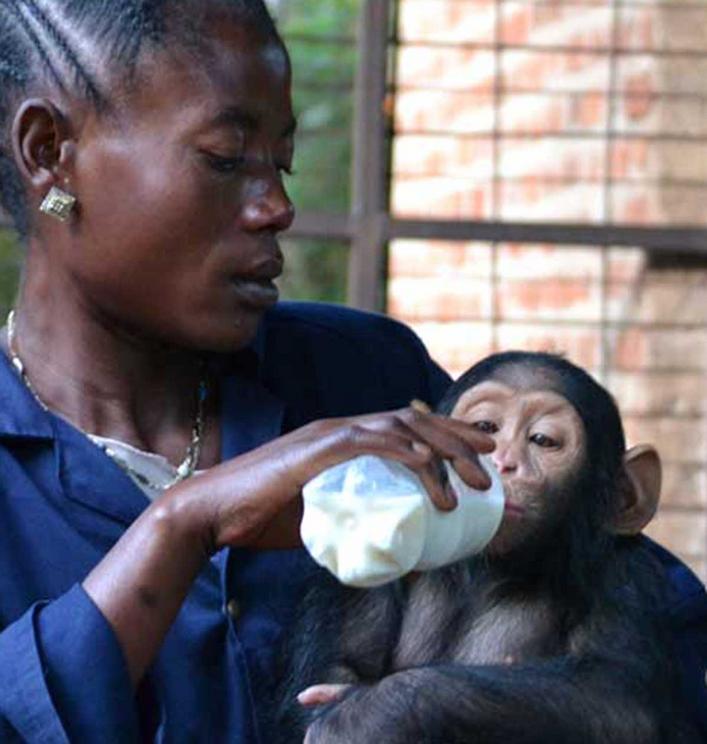
- GRACE also provides women and their families with bushmeat alternatives by teaching them to care for and breed alternative protein sources. Coopera helps provide alternative food sources through ECOLO-FEMMES, an organization that trains women in livestock breeding and agriculture to reduce great ape hunting in Kahuzi-Biega National Park.
- Coopera, working with Jane Goodall’s Roots and Shoots, engages young rape victims in tree planting to provide food sources to wild chimpanzees. JGI’s women’s programs in Uganda and Tanzania keep girls in school through peer support, scholarship programs and sanitary supply access. Educated women have smaller families, reducing stress on the environment.
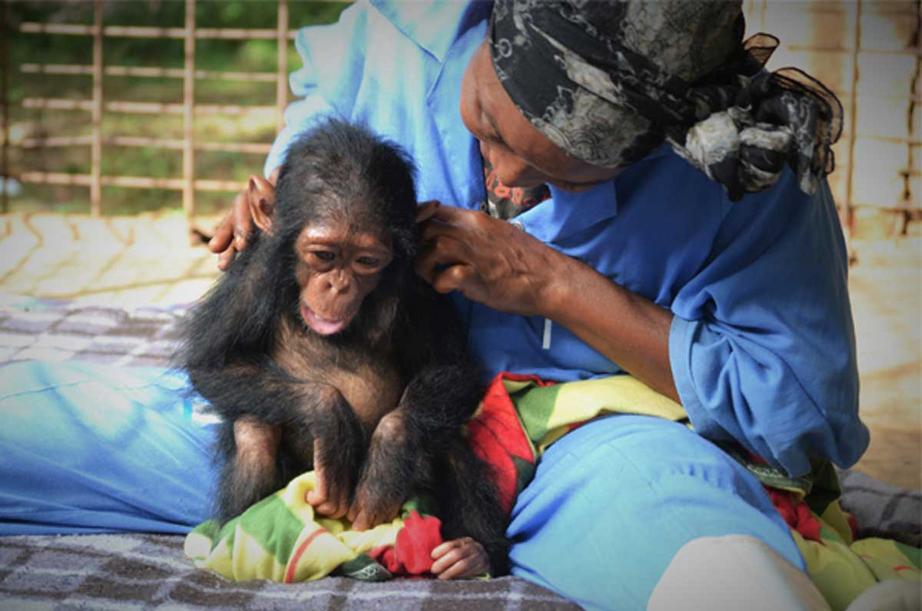
A Coopera caregiver offers love and attention to an orphaned chimpanzee. Human caregivers are extremely important in the early stages of great ape rehabilitation. Photo courtesy of Coopera
Ongoing violence in the Democratic Republic of the Congo (DRC) has taken a heavy toll on the country’s women, with sexual violence there gaining the DRC a label as the “most dangerous place to be a woman.” The nation’s civil strife — along with bushmeat hunting and human encroachment — also threaten its wildlife, especially gorillas, bonobos and chimpanzees.
According to the African Wildlife Federation website, bonobos have been vanishing rapidly for the past 20 years from their habitat, which is restricted to the DRC. Meanwhile, only about 1,000 Critically Endangered Grauer’s gorillas remain in their DRC homeland. Chimpanzees, found in 21 African countries, including the DRC, are also IUCN Red Listed as Endangered.
But now, DRC women are overcoming their own difficulties, and with a novel assist from international conservation organizations, are coming to the rescue of Congo’s great apes.
The Bonobo Conservation Initiative (BCI), Gorilla Rehabilitation and Conservation Education Center (GRACE), the Jane Goodall Institute (JGI), and Coopera are all working side-by-side with local women to help advance great ape conservation through education, empowerment, access to health care and food security.
Women “are the glue of the villages” and the biggest influencers on children and other community members, so tapping into their power is imperative, asserted BCI founder and president Sally Jewell Coxe.
Females are the “foundation of the African community,” agreed GRACE executive director Sonya Kahlenberg. As such, women have a crucial role to play in great ape conservation.
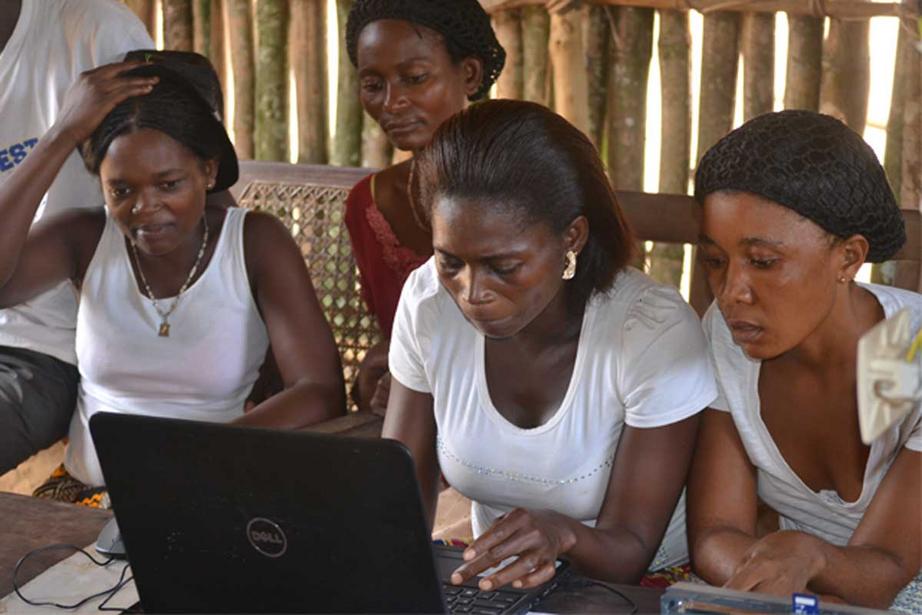
Women receive information technology training in the Kokolopori Bonobo Reserve. Bijoux Lolenge Mpako (far left) is a graduate of the Djolu Technical College and now serves as logistician and program manager for the reserve. Photo courtesy of the Bonobo Conservation Initiative
Business opportunities and training
One way to reduce hunting pressures on great apes is to provide alternative livelihoods for families — especially women — living near prime primate habitat.
BCI helps women earn incomes by funding pilot micro-credit projects by helping to launch soap making, garment making, and other business enterprises. BCI also recently provided sewing machines and training to the Women’s Association of Kokolopori and the Association of Rural Women of Djolu Territory; according to Coxe, this is one of BCI’s most successful initiatives. The women involved in the project designed their own couture, selling their creations at market.
“I am proud to be a partner of BCI and grateful to receive the benefits of conservation, especially through education at the Djolu Technical College (ISDR-Djolu) and support for micro projects,” attested Josephine Mpanga, founder of the Association of Rural Women of Djolu Territory.
Coxe said that supporting these small business initiatives equips women with the skills and means to initiate income-generating projects that help reduce economic demands on families, including the need to gain income from hunting great apes for bushmeat and the wildlife trade.
“In the male-dominated Congolese society, women have traditionally not received as much access to education or employment as have men,” Coxe noted. “With the tools and opportunities to improve their livelihoods and generate income themselves, women gain a sense of ownership and empowerment.” And according to Coxe, that empowerment can lead directly to the establishment of a conservation ethic in local communities.
Providing bushmeat alternatives
Violence and instability during the Second Congo War from 1998-2003 created severe food insecurity in the DRC, with families — especially the poorest — turning to bushmeat to survive. Today, snares that target other animals also reduce local great ape populations.
GRACE provides women and their families with alternatives to bushmeat by teaching them how to care for and breed alternative protein sources. Participants earn an income selling the meat, eggs and offspring of the animals they raise. The program started with chickens and rabbits, but the women showed their economic savvy and business acumen by making a successful switch to the locally common and often eaten guinea pig, which is easier to care for and breed.
Kahlenberg reports that the program is growing and popular with local women like Kahindo Isesomo from Katoyo village. Guinea pig “meat is a big source of protein to fight malnutrition for kids and adults,” Isesomo said. “It is a source of income to the family to solve some little financial problems, and can be paid to school for school fees.”
BCI is also cooperating with local women to promote bushmeat alternatives. “Hunting is deeply ingrained in the history and culture of the people of the rainforest and the commercial bushmeat trade offers one of the only reliable sources of income for many people,” BCI’s Coxe explained. “So, while we’ve been successful protecting bonobos in key areas of their habitat, reducing all hunting is a much more difficult task.” Coxe stressed that finding alternative sources of income is key.
The organization provides aid for animal husbandry and pisciculture — the breeding and rearing of fish by artificial means — with local cooperatives and women’s groups in and around the Kokolopori Bonobo Reserve and the Djolu Technical College, which was co-founded by BCI. The college offers courses and training open to women in animal husbandry and agriculture.
Coopera is another organization helping to provide alternative food sources, and is doing so through ECOLO-FEMMES, an amalgam of 10 women’s associations with about 680 members. The organization trains women in livestock breeding and agriculture, and aims to strengthen local rural socio-economic structures by providing alternative sources of income to dissuade men from entering nearby Kahuzi-Biega National Park to hunt for great apes and other wildlife.
“Women are the ones running their homes and the ones in charge of education of their kids,” noted Lorena Aguirre Cadarso, Coopera DRC country director. “So it is vital to change women’s behaviors to change the society. For example, if [women] refuse to prepare bushmeat, their family will eventually stop consuming it.”

A caregiver feeds an orphaned chimpanzee at Centre de Rehabilitation des Primates de Lwiro. Photo courtesy of Coopera
Surrogate caregivers
Women are also playing an instrumental role in DRC great ape infant surrogate programs, bringing with them their natural sensibilities as mothers.
GRACE employs women as surrogate mothers during its initial 30-day quarantine period for gorilla intakes. Newly arrived orphaned gorillas often are young un-weaned infants that need special around-the-clock care. Women caregivers sleep near the orphaned primates, take them out for forest explorations during the day, help feed them, and aid the animals in healing from the traumatic loss of their forest homes and family groups.
“That’s a really hard job to have a gorilla attached to you all the time. A lot of women had never done anything like this before,” Kahlenberg told Mongabay. “Caring for these gorillas and nursing them back to health has been life changing for the women. In the Congo, so many terrible things have happened [to people]. We’ve seen women working for us turning into gorilla moms.”
Women great ape caregivers also see themselves as conservation ambassadors in their communities, said Kahlenberg. “GRACE staff members are important leaders in the local women’s group,” she said. “When they were hired [as caregivers], they had never seen a gorilla before, and caring for gorillas orphaned by poaching has changed them.”
Jackson Mbeke, GRACE center director, agrees that DRC women who serve as surrogate mothers often make more conscious and sustainable use of natural resources and have heightened their stewardship to the local environment. “They used to burn their fields and engage in other actions that are harmful to the environment, but they don’t do that now. And they encourage other women in their community to do the same,“ Mbeke said.
“Women are very important because they react towards baby orphaned gorillas as they do with their own children,” said GRACE Caregiver Aldegonde Saambili. “The woman can also play an important role in conservation by advising her husband about the bad consequences of poaching.”
These women are role models in their community, according to Mbeke. “When [other] women come to GRACE and see local women working at good, important jobs, it motivates them to send their daughters to school.”
Empowering rape victims
Although exact numbers are unknown, the DRC is widely considered to be the rape capital of the world.
That’s a key reason why Coopera works to empower women and children, including rape victims, in its mission to protect the environment and endangered species near Kahuzi-Biega National Park. Coopera, working with Roots and Shoots, a worldwide service program founded by primatologist Jane Goodall, engages young rape victims in projects such as the planting of trees to provide food sources to wild chimpanzees.
“This we believe [plays a great role in children’s] psychological recovery because they need to be integrated with other kids of the community. But also they have a regular reason to continue with their lives — they become nature’s ambassadors,” explained Itsaso Velez del Burgo Guinea, Coopera’s DRC head of mission. The organization also provides medical attention in rural areas, psychological support through individual or group therapy and socio-economic reinsertion.
“The kids are in the program with us for three years minimum, so we can follow up on their evolution,” explained Lorena Aguirre Cadarso, Coopera’s DRC country director. “[P]arents explain how the girls change. They don’t have nightmares, they don’t cry to go to the school, they have good marks at the school, they are not fearful to go out of the house, they don’t wet the bed, they play more with the neighbors,” — all marks of trauma recovery.
Velez del Burgo Guinea shared the story of one indomitable rape victim, who was kidnapped by rebels for three months and raped every day by different men. Pregnant, she returned home and gave birth. Then 11 armed men raped her again and she was hospitalized for six months. Once released, Coopera trained her as a psychologist support agent for former child girl soldiers. While working one morning, she was raped still again and hospitalized for two more months. Coopera took her in, buying the woman the land she needed to construct a house.
Despite all these challenges, del Burgo Guinea is proud to declare that this woman has become one of the finest chimpanzee “moms” at the Centre de Rehabilitation des Primates de Lwiro, a facility managed by Coopera and two other organizations.
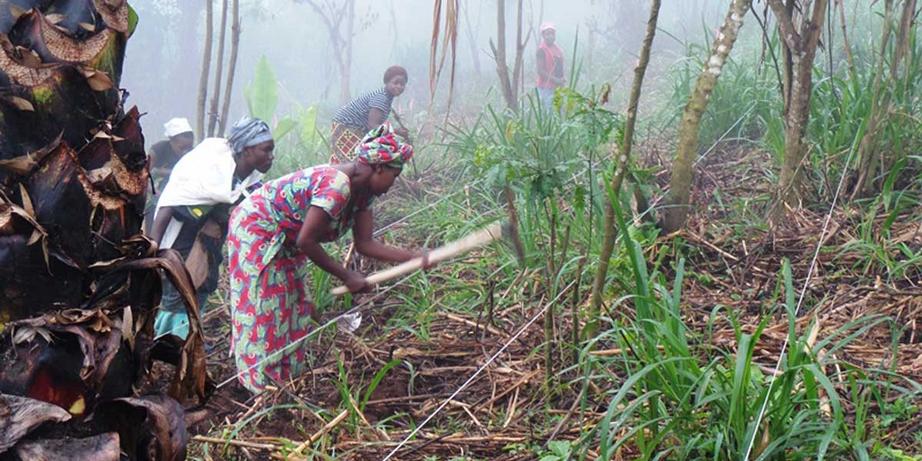
Women volunteer on a farm that produces food for orphaned gorillas at GRACE. Photo courtesy of the Gorilla Rehabilitation and Conservation Education Center
A collective voice for conservation
In the Congo basin, women farm and collect wood and water, and so are the primary users of natural resources, according to Kahlenberg. Thus, she explained, “It is critical that they have a seat at the table in conservation. Women also have their finger on the pulse of their communities so they can advise on what conservation approaches will and will not work.”
GRACE brought female leaders together in a new women’s group that acts as a support network and helps women collectively encourage better environmental practices. GRACE is currently partnering with the women’s group on a project to build fuel-efficient stoves in village homes.
“Pressure on nearby gorilla habitat is coming from people using the forest for their [cooking stove] fuel needs,” Kahlenberg explained. “We aim to cut wood and charcoal use in half by having women switch to stoves that burn more efficiently. This change would directly benefit gorilla habitat and would also greatly benefit [the health of] women and children, who are the most likely to be exposed to indoor smoke [and respiratory diseases resulting] from inefficient cooking fires.”
She also explained that women and children devote many hours each week to collecting and carrying firewood, so the better cook stove initiative could recoup time to be spent on other activities, including conservation. “Cooking is traditionally a women’s activity in this culture, so if this project is to succeed, it must be the women who lead the way,” Kahlenberg said.
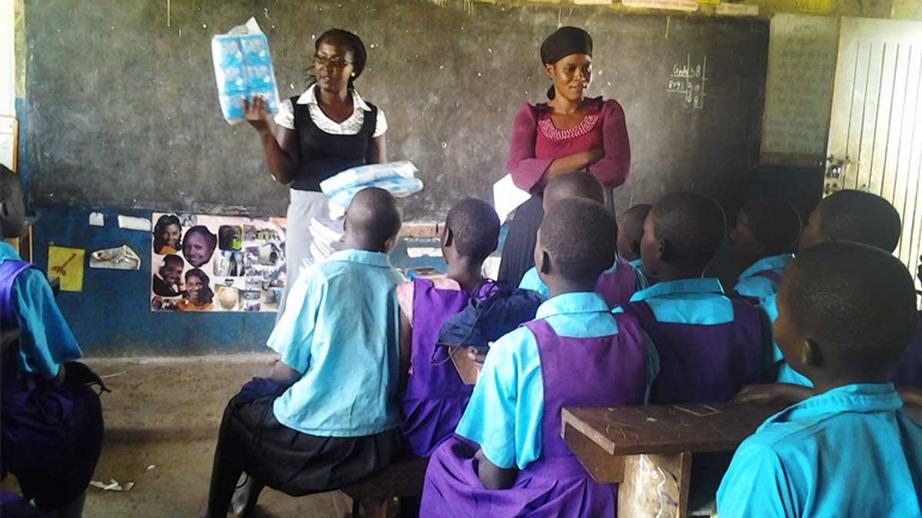
An educator with the Jane Goodall Institute’s peer educator program teaches a class. Photo courtesy of the Jane Goodall Institute
Keeping girls in school
Conservation groups are also working across the region to integrate and align women with their conservation goals; one way of doing that is through improved education.
JGI’s women’s programs — centered primarily in neighboring Uganda and Tanzania — help keep girls in school through peer support networks, scholarship programs and access to sanitary supplies.
“One of the challenges we face is when girls go through puberty, they’ll miss school because they’re not equipped” with monthly sanitary supplies, said Shawn Sweeney, JGI’s senior director of communications and engagement. In this region, he said, girls may miss up to one third of a school year because of their menstrual periods.
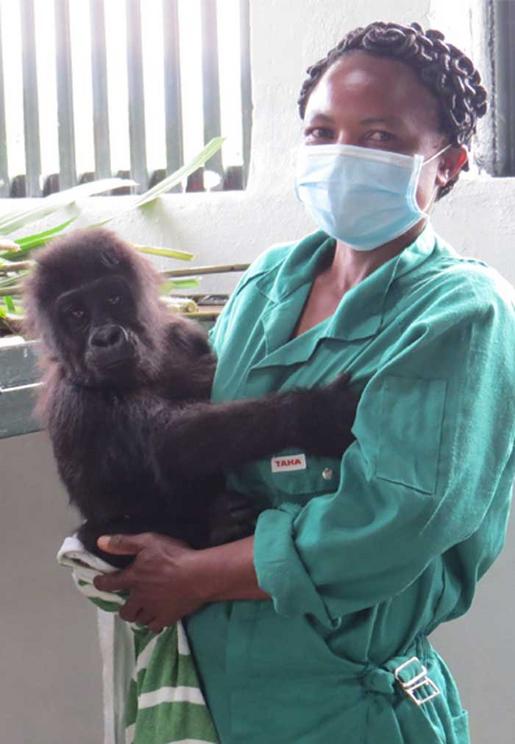
GRACE caregiver Aldegonde Saambili tends to a newly orphaned Grauer’s gorilla. Photo courtesy of the Gorilla Rehabilitation and Conservation Education Center
JGI also trains young leaders as peer mentors to help keep girls in school. The mentors identify girls who have dropped out of school and support their return; they also distribute scholastic and sanitary supplies, give presentations and work closely with teachers.
The organization trained more than 700 peer educators, reaching nearly 7,000 young students in Uganda. Peer mentoring has resulted in bringing nearly 600 girls back into school, according to Sweeney.
A young student in Uganda named Lilian, for example, was forced to drop out after the death of her father, which left the family unable to afford necessary items like underwear and sanitary pads. But through the help of her peer educator friend Jerline, Lilian was able to obtain the supplies she needed to go back to school.
“Helping young girls like Lilian finish their education is absolutely critical if JGI is to improve the lives of communities in Africa and preserve the chimpanzee habitats surrounding those communities,” according to the JGI website. “JGI’s Peer to Peer Education Project initiative helps girls complete their education … a key step to increasing the economic stability of communities located near chimpanzee habitat areas.”
JGI has also supported the education of more than 300 girls in Tanzania since 1998 through its scholarship program, which provides girls and women with the resources needed to complete their education. Recipients also participate in Roots and Shoots.
Sweeney explained how keeping young women in school helps positively impact chimpanzee conservation. Better educated women, he said, translates into smaller family sizes; and smaller families draw less on surrounding forests and have fewer conflicts with great apes. He added that JGI plans to expand its work in the Congo pending funding availability.
Women, a natural in primate conservation
Bonobos live in matriarchal societies that honor the females, so women’s initiatives are a natural fit for BCI, said Coxe. She also noted that pathfinding women — including primatologists Jane Goodall and Dian Fossey — have played an integral role in great ape protection for many decades.
“They really set a precedent and it’s a case of a lot of women leading in conservation,” Coxe concluded. “Women have a certain affinity with the land and a certain disposition to care for it. Symbolically as well as practically, the woman’s role is important in conservation.”

